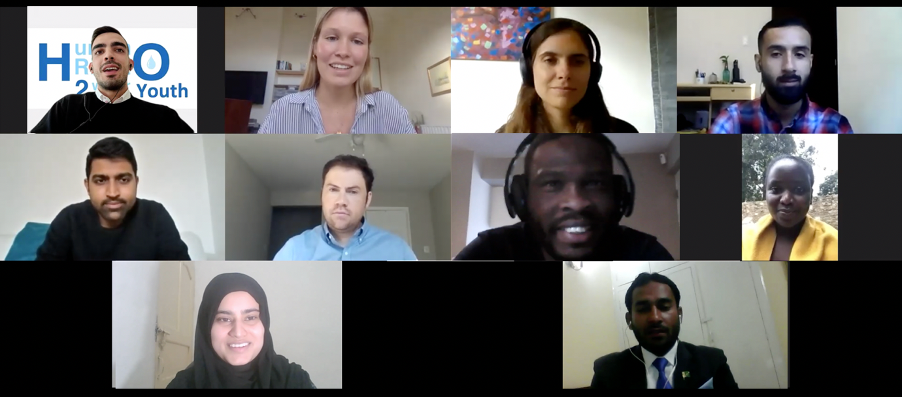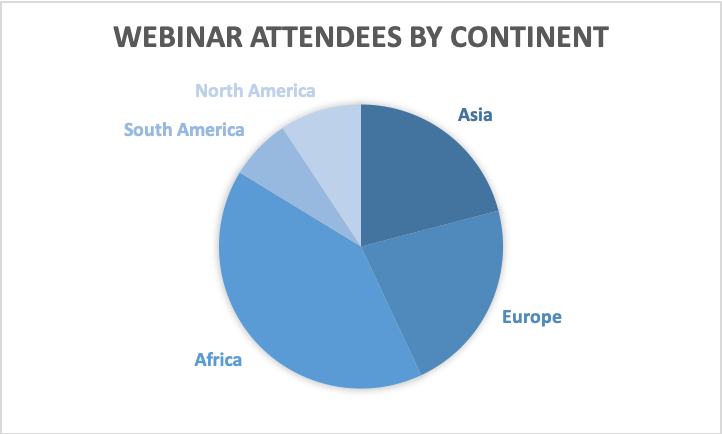
Middle Row (Left to Right): Abishek Narayan, Daniel Cano, Ashton Busani Mpofu, Sheila Ruyondo
Bottom Row (Left to Right): Nuzhat Bashir, Muhammad Wasif Bashir Baber
Read more about our panellists and the Declaration.
“Young people are not THE solution to the human right to water, we are part of a larger solution.”
Striking words from one of the young panellists, Abishek Narayan. This month’s Human Right 2 Water webinar brought together youth network leaders on water and sanitation from around the world.
With the emergence of constant technological advancements and new platforms of communication, the ability to adapt and to innovate are some of the qualities that young people can offer to issues surrounding water and sanitation. According to UNESCO, people under the age of 30 accounted for more than half of the world’s population in 2012, and with the drive and passion that the youth possess, they have the capability to play a fundamental role in societal change.
Nobody can understand the importance of engaging youth in policy and decision-making better than young experts, activists and water and sanitation entrepreneurs themselves. We were very fortunate to welcome a range of young and accomplished experts joining us from as far apart as Mexico, USA, South Africa, Uganda, Pakistan, Belgium and finally Switzerland.
Building on their experiences, the panellists, explored ways that the involvement of young people in water-related projects has been beneficial to promote and protect human rights, and we heard about a series of case studies that helped us gain an understanding of the main challenges faced by young people as they strive to play a role in the decision-making processes.
A declaration reflecting our commitment to involving the youth in water governance and to responding to the most pressing challenges that we are facing today was also included as part of the webinar.
Human Right 2 Water’s Gussie Lloyd opened the webinar with an introduction of the topic, emphasising its’ importance within today’s context. “The global impact of the COVID-19 pandemic is an example of the urgent need to provide innovative and responsive WASH solutions to realise everyone’s human rights to water and sanitation.”
Imanol Aguilera, Legal Officer at Human Right 2 Water and joint host, followed with an insight into some of the other threats we face in 2020. “Climate Change has been described as the defining issue of our time, and we are conscious of the greater exposure of certain members of society to the worst effects of this phenomenon,” before introducing the panellists.
Joining us from the Organisation of American States, Daniel Cano, Advisor on Indigenous Affairs for the Office of the Secretary General, discussed the challenges surrounding environmental conservation and water rights and the central role that young people can play as agents of change in Indigenous communities.
“Young indigenous people can bring innovative and creative solutions to tackle the problems regarding water within their communities. They can be the Bridge between their villages and a global, modern, hyper-connected world.”
Antonella Vagliente, joining us from Belgium, is co-founder and director of Young Water Solutions and a prime example of a young and dedicated individual, began her environmental work at only 15 years old. Antonella gave us an overview of some of her work in a youth initiative, stating “Young Water Fellowship provides training, mentorship and seed funding to young people who have impactful ideas but are missing resources to implement them.”
We welcomed the globally recognised young Human Rights to WASH leader and Sustainable Development Goals (SDGs) advocator, Muhammad Wasif Bashir Babar from Pakistan. Wasif highlighted the need to create healthy and intergenerational platforms of dialogue. “It is important to realise young people have the potential to raise their voice from a local to a global level, but they need to be provided with a platform to do so.”
Human Right 2 Water welcomed Nuzhat Bashir, also from Pakistan and a youth leader and social entrepreneur in WASH. Nuzhat spoke about her project on Menstruation Hygiene Management as a fundamental human right and a necessary step in achieving gender inclusion, integrity and equity. “My objective is to develop communication among young girls and women in rural communities about menstruation and to encourage local sanitary pads and hygienic practices.”
Moving from South Asia to South Africa, our following expert was Ashton Busani Mpofu, senior water sector analyst at Green Cape Sector Development Agency and National Lead of the South African Young Water Professionals. Ashton provided an insight into the South African context, notably on issues of water access and inequalities. “South Africa has a very large disparity between the rich and the poor, and we still have around 8 million people without safe access to water and sanitation.”
Sheila Ruyondo, the East Africa Local Coordinator from Young Water Solutions in Uganda founded the NGO, Turi Kumwe, which helps to improve access to water and sanitation in vulnerable communities, Sheila shared her experiences as a young leader in WASH. “We are looking at increased youth engagement and policy dialogues and we are recommending that the government of Uganda work more closely with youth organisations.”
A member of the Human Right 2 Water team based in Mexico, Cuauhtémoc Osorno Córdova, a researcher in water, sanitation, public policy and human rights, gave us an overview of the multifaceted challenges surrounding water governance through his work with World Youth Parliament for Water. “In Mexico, there is an adult-centred paradigm in public policy and governmental spaces, and often young people are excluded from the process.”
Our final guest was the coordinator of the Swiss Water Partnership Youth and a firm believer in the contribution that young people can make towards the SDGs. Abishek Narayan introduced some of their work on inter-generational dialogue and how they provide the right enabling environment for young people to contribute effectively.
The session wrapped up with a brief discussion on the Youth Declaration that our panellists had collaboratively designed, on the importance of engaging youth in the dialogue on water and human rights. This declaration will act as a starting point for future endeavours of the community of young people’s networks that have been brought together by this event.

A hundred attendees and over 150 registrants joined us from all over the globe, including Africa, Asia and the Americas.
For those of you who were unable to join, a recording of the webinar is available.
Next month’s webinar will focus on the business case for the human rights to sanitation. The event will be held on the 10th November with further details to be announced shortly.
Find panellist slide presentations here: Daniel Cano, Antonella Vagliente, Sheila Ruyondo, Cuauhtémoc Osorno Córdova, Abishek Narayan

